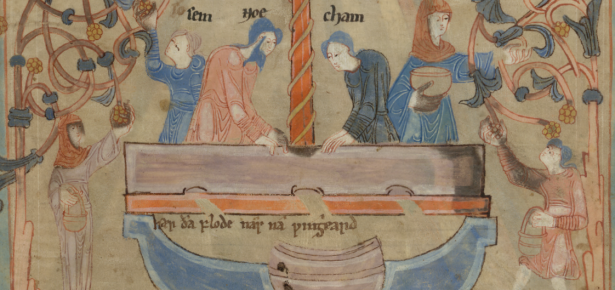
To the parodyists Sellar and Yeatman, the Norman Conquest of 1066 was one of only two noteworthy dates in English history. The date has loomed large in literary histories too, where it has been considered a ‘solid bookend’, between Beowulf and Old English literature on the one hand, and Chaucer, his precursors and his imitators who comprise the Middle English canon on the other. In some literary and linguistic histories, 1066 has been not just a convenient point to end or begin, but an event freighted with massive cultural significance, as chapter titles like ‘The Loss of Literature: 1066’ or ‘The Norman Conquest and the Subjection of English, 1066-1200’ suggest. Such titles both respond to and perpetuate a narrative that nothing was written in English in the century and a half that followed the accession of William the Conqueror and his descendants to the English throne.
The last twenty years have seen a swathe of work by scholars like Elaine Treharne, Mary Swan, Stephen Pelle and George Younge that has drawn attention to texts and manuscripts that were written in English in this period and which by their very existence show that this narrative, though inherently compelling in its simplicity, must be wrong. My own light-bulb moment came in winter 2004, when I encountered a manuscript known as ‘The Old English Illustrated Hexateuch’, a copy of the Old English translation of the first seven books of the Old Testament originally made in the second quarter of the eleventh century, but extensively annotated in English and Latin in the second half of the twelfth, a time when the traditional narratives said readers should have had no interest in Old English texts, still less in augmenting them.
My New Literary History of the Long Twelfth Century: Language and Literature between Old and Middle English, is an attempt to provide a new account of what happened to English in the aftermath of the Norman Conquest to replace the narrative of its immediate repression that these scholars have so firmly discredited. In it, we encounter law codes like William the Conqueror’s own Lad, inscriptions, English entries in bi- or trilingual glossaries, saints’ lives and miracle narratives, biographical notices, and sentences transcribed by twelfth-century historians from the mouths of ordinary people. We get to know authentic royal writs issued by Henry I and his successors, purported pre-Conquest vernacular documents forged after 1066, chronicle annals that record the present and rewrite the past, and sermons that render the parables of twelfth-century churchmen like Bernard of Clairvaux into English by borrowing language from earlier vernacular homilists. And we come to a new understanding of who spoke English, wrote English, copied English, read English and heard English read in the long twelfth century, and how these people’s competencies in English fitted into their overall linguistic repertoires, which often included Latin, French and sometimes other languages.
According to one contemporary writer, when William the Conqueror was crowned on Christmas Day 1066 in Westminster Abbey, both the Normans and English cheered. To the Norman guards, English was however an ‘unknown tongue’, and they mistook celebration for treachery and this ignorance led them to violence, as they burned down houses near the abbey. It is my contention that twelfth-century English has for too long been the unknown tongue of literary and linguistic histories. I hope my book is a first step towards making it more widely heard.
Latest Comments
Have your say!